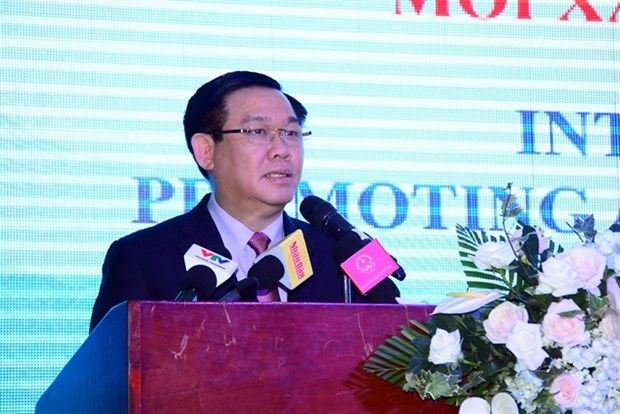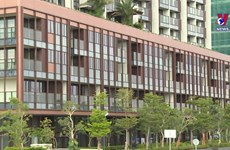Global links key to rural growth
Deputy Prime Minister Vuong Dinh Hue has asked agencies to enhance linkages between cities and provinces nationwide and other countries to form a global network for the OCOP programme.
 Deputy Prime Minister Vuong Dinh Hue speaks at the Global OCOP Network Connection Forum held yesterday in HCM City (Photo: VNA)
Deputy Prime Minister Vuong Dinh Hue speaks at the Global OCOP Network Connection Forum held yesterday in HCM City (Photo: VNA)HCM City (VNA) - Deputy Prime Minister Vuong Dinh Hue has asked
agencies to enhance linkages between cities and provinces nationwide and other
countries to form a global network for the One Commune, One Product (OCOP)
programme.
The Deputy PM said the OCOP programme will help restructure the rural economy, reduce migration of rural labourers to cities, and protect the environment, as well as maintain social stability in rural areas.
Speaking at the Global OCOP Network Connection Forum held in Ho Chi Minh City on April 17, Hue noted that the programme improves the quality of Vietnamese agricultural products and services, and enhances trademarks and the value of local products both nationally and globally.
“Thanks to the programme, many quality products with great designs made in rural areas are distributed in prestigious local and foreign stores, supermarkets and supermarket chains,” he said.
“The programme has improved the new rural area development model, especially the livelihood criterion that is part of the model,” he noted.
According to the Ministry of Agricultural and Rural Development (MARD), that 42 of 63 provinces and major cities have approved implementation of OCOP projects.
The programme’s objectives in the 2018-20 period include improving agricultural and non-agricultural products and services in each locality, creating a value chain with the involvement of the private and public sectors.
Developing agricultural tourism is also one of the important measures, he said.
Vietnam has 6,010 registered agricultural enterprises, co-operatives and production households, with 4,823 “strong” (those with a competitive advantage) agricultural products, he added.
Groups of goods and services defined in the programme include food (fresh and processed farm produce); beverages (alcoholic and non-alcoholic drinking); medicinal herbs (products made from herbal plants); fabric and textiles (products made from cotton and yarn); souvenirs, furniture, and decorations (products made from wood, fiber, rattan, metal and ceramics); and rural tourism services and sales (services for sightseeing, tourism, study and research).
The programme is implemented at an estimated cost of 45 trillion VND (1.94 billion USD).
Capital comes from many sources such as SMEs, cooperatives, and production households, as well as loans from credit institutions, investment funds, SMEs development funds, and funding from international organisations.
To date, 43 countries have approved the OCOP programme, 20 of which have joined the network.
The one-day forum was chaired by MARD in coordination with the Vietnam Handicraft Export Association (Vietcraft), “One Village, One Product” (OVOP) International Cooperation Committee (Japan), and the OCOP Global Network Connection.
The forum aims to strengthen cooperation between the countries in implementing OVOP or OCOP programmes, as well as promoting the OVOP or OCOP movement in the world and Vietnam. - VNA
The Deputy PM said the OCOP programme will help restructure the rural economy, reduce migration of rural labourers to cities, and protect the environment, as well as maintain social stability in rural areas.
Speaking at the Global OCOP Network Connection Forum held in Ho Chi Minh City on April 17, Hue noted that the programme improves the quality of Vietnamese agricultural products and services, and enhances trademarks and the value of local products both nationally and globally.
“Thanks to the programme, many quality products with great designs made in rural areas are distributed in prestigious local and foreign stores, supermarkets and supermarket chains,” he said.
“The programme has improved the new rural area development model, especially the livelihood criterion that is part of the model,” he noted.
According to the Ministry of Agricultural and Rural Development (MARD), that 42 of 63 provinces and major cities have approved implementation of OCOP projects.
The programme’s objectives in the 2018-20 period include improving agricultural and non-agricultural products and services in each locality, creating a value chain with the involvement of the private and public sectors.
Developing agricultural tourism is also one of the important measures, he said.
Vietnam has 6,010 registered agricultural enterprises, co-operatives and production households, with 4,823 “strong” (those with a competitive advantage) agricultural products, he added.
Groups of goods and services defined in the programme include food (fresh and processed farm produce); beverages (alcoholic and non-alcoholic drinking); medicinal herbs (products made from herbal plants); fabric and textiles (products made from cotton and yarn); souvenirs, furniture, and decorations (products made from wood, fiber, rattan, metal and ceramics); and rural tourism services and sales (services for sightseeing, tourism, study and research).
The programme is implemented at an estimated cost of 45 trillion VND (1.94 billion USD).
Capital comes from many sources such as SMEs, cooperatives, and production households, as well as loans from credit institutions, investment funds, SMEs development funds, and funding from international organisations.
To date, 43 countries have approved the OCOP programme, 20 of which have joined the network.
The one-day forum was chaired by MARD in coordination with the Vietnam Handicraft Export Association (Vietcraft), “One Village, One Product” (OVOP) International Cooperation Committee (Japan), and the OCOP Global Network Connection.
The forum aims to strengthen cooperation between the countries in implementing OVOP or OCOP programmes, as well as promoting the OVOP or OCOP movement in the world and Vietnam. - VNA













